Fire Safety Law for Holiday Letting
Last Updated on October 23, 2020 by admin
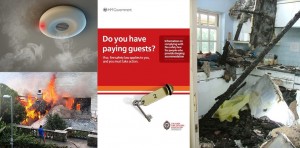 There are many different ways in which a fire could start in your holiday home. Having an understanding of the risks that fire poses to your property and your guests is vital to ensuring a safe stay in your cottage and complying with Fire Safety Law for Holiday Letting.
There are many different ways in which a fire could start in your holiday home. Having an understanding of the risks that fire poses to your property and your guests is vital to ensuring a safe stay in your cottage and complying with Fire Safety Law for Holiday Letting.
Complying with Fire Safety Law for Holiday Letting and completing a fire risk assessment
What is Fire Safety Law?
Fire Safety Law (known as Regulatory Reform (Fire Safety) Order 2005) was introduced in 2006 and makes holiday homeowners responsible for taking measures to protect guests from the risks of fire.
Does it apply to you?
Fire Safety Law will apply to all tourism accommodation providers including holiday homeowners; if anyone pays to stay in your property, other than to live as a permanent home, you will need to comply.
What do you need to do?
There are three core areas to Fire Safety Law compliance:
- Conduct a fire risk assessment
- Improve your fire safety measures as a result of issues highlighted in the assessment
- Keep the risks and measures under review
How do you conduct a fire risk assessment?
A fire risk assessment is a thorough review of the risks of fire within your holiday home, the people that will be visiting your property and the measures you need to put in place to keep them as safe as possible.
It should broadly incorporate five parts:
- What are the fire hazards in your holiday home?
This should highlight any area of your holiday home in which a fire could begin. The most common causes of fire in holiday homes include kitchens and cooking, electrical appliances, candles, smoking and chimneys.
Our example:
If you have candles in your holiday home the naked flame from these could be a potential fire risk.
- Who is at risk?
Consider who is at risk as a result of each potential hazard; do you have young families staying in your holiday home? Older guests? Disabled guests?
Think carefully about the specific risks they may face.
Our example:
Candles are of particular risk to young children who could knock them over or be tempted to play with the flame.
- What is your plan to keep people safe?
Having considered the potential hazard and which of your visitors is at risk, how are you going to make sure they stay safe? What can you put in place to either mitigate or minimise the risk to your guest?
Our example:
Candles will be kept out of the reach of children and placed in holders that shield the naked flame.
- Record, train and plan
Make a note of the hazard and any measures you have put in place to minimise the risk. These measures should be communicated to anyone that will be involved in implementing or maintaining your fire safety plan.
Our example:
It was decided that candles would now only be positioned in areas of the holiday home that children couldn’t reach and be placed inside holders.
The holiday home cleaners were instructed of the changes and asked to ensure candles were only placed in those areas and that any broken holders were replaced within 2 days. The candle would be removed until a replacement holder was available.
- Maintaining your fire risk assessment
Your assessment should include regular reviews of its effectiveness. This will also allow you to identify and highlight any potential issues that have arisen since you last put your plan in place.
Our example:
When initially conducting the assessment it was decided another full review would be conducted in two months time.
The review indicated that the steps to minimise the risk of candle fire and accident had been successful, but also highlighted a new barbeque had been added for the beginning of summer; steps would be put in place to address this new potential hazard.
With many guests booked in over the coming month a review would be completed in one month rather than two.
These documents will assist you with the Fire Safety Law for Holiday Letting as a holiday home owner to comply with your obligations under the Regulatory Reform (Fire Safety) Order 2005. Click the links below to find out more:
Holiday Home Fire Safety in England and Wales:
- Do You Have Paying Guests? If so, fire safety law applies to you, and you must take action
- Example Fire Risk Assessment Form
- Fire Safety for Houses in Multiple Occupation
- Fire Risk Assessment Tool
For Self-Catering holiday cottage owners in Scotland, the Scottish Government has produced the following:
For Self-Catering holiday cottage owners in Northern Ireland, the Northern Ireland Fire and Rescue Service has produced the following PDF guide:
You may also find the following posts for holiday home owners of interest:
- Holiday home gas safety checks
- Solid fuel fire safety for holiday home owners
- Protect yourself and your guests from carbon monoxide poisoning
- Preventing the five most common causes of fire holiday homes
Boshers offer specialist holiday home insurance to owners across the UK. For more information on how a specialist insurer can help and support your holiday home business, please give us a call on 01237 429444.
Please note that this article gives only an overview of Fire Safety Law for Holiday Letting and we suggest you take advice from a qualified professional before making any decisions in this area if you are not confident of using the above guidance.

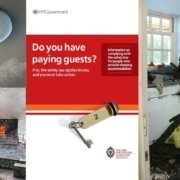

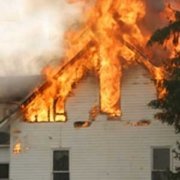
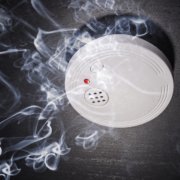
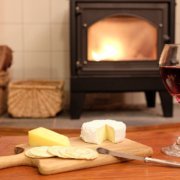
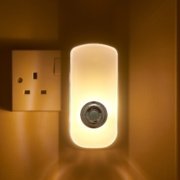


What are the legal requirements with regards to fire extinguishers and fire blankets in a holiday let? I’m struggling to find a clear instruction on what is legally required?
Thanks for your question, I’m afraid there is no definitive answer as all properties are different but assuming the holiday let to which you refer is in England you’ll find the guidance you need in this publication: Do you have paying guests?
I am having some curtains made for our holiday rental. What are the legal requirements regarding fireproofing fabric for curtains and cushions?
You’ll find information on Fire Safety of furnniture and furnishings in your holiday home here. Hope this helps!
Hello
What are the legal requirements for fire extinguishers and fire blankets in holiday lets and assured tenancies in Wales, please?
Thanks.
I’m afraid that we cannot give individual advice on fire safety but you will find the guidance you are looking for here for Furnished Holidays Lets Fire Safety Law for holiday Letting and here for Residential Lets Renting out your property (England and Wales) Landlord Responsibilities Both apply to England and Wales, you’ll have to make your own decisions on fire safety equipment based on the guidance and the findings of your fire risk assessment. If in doubt seek advice from a professional such as those whom are a member of BAFE (British Approvals for Firefighting Equipment) https://www.bafe.org.uk/